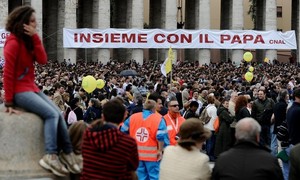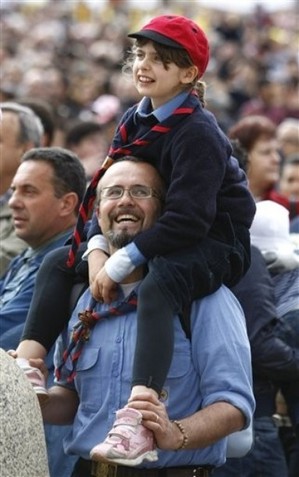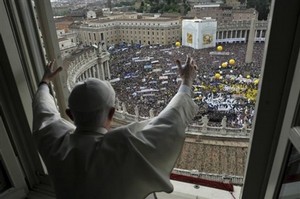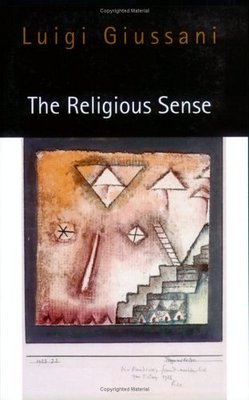 This coming year the Schools of Community throughout the world will be working on Monsignor Luigi Giussani’s seminal text, The Religious Sense (in English in 1997).
This coming year the Schools of Community throughout the world will be working on Monsignor Luigi Giussani’s seminal text, The Religious Sense (in English in 1997).
Category: Luigi Giussani
The Tidings Brought to Mary
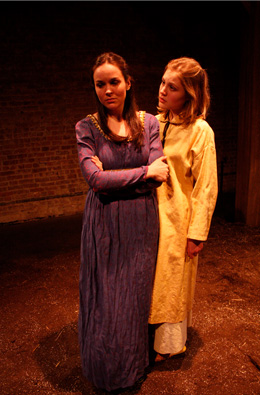 Paul Claudel’s extraordinary play, “The Tidings Brought to Mary” will be presented by Blackfriars Repertory Theater and the Storm Theater.
Paul Claudel’s extraordinary play, “The Tidings Brought to Mary” will be presented by Blackfriars Repertory Theater and the Storm Theater.
Keep the conversation with the Lord going
I’ve been conscious of how busy everyone is, or pretends to be. Excuses run rampant as to why one can’t do thus-and-such, or … or …. One person asked the perennial question: How do I maintain my relationship with God? Father Giussani asked a similar of question of members of Communion & Liberation. He answered by telling his questioner that to keep the Lord’s name on our lips and to recognize the way the Lord has looked at us He looked at Zacchaeus in the sycamore tree. Giussani also reminded us to be attentive to reality as God has given it to us and not as we want it to be. Maintaining one’s relationship with God alive is easy if you move in small but deliberate steps by following a long held custom of praying short prayers that re-focus our attention: Jesus, Mary and Joseph, pray for us; Come Holy Spirit, come through Mary; Lord, Jesus Christ, have mercy on me, a sinner; O Mary conceived without sin, pray for us who have recourse to thee; Saint Catherine of Siena, pray for us; and so on. Short prayers such as these examples are remarkable keeping my mind and heart on target and away from sin. I have the practice of praying my own version of the Litany of Saints as I walk up and down the aisle when attending Mass or when I am making the Morning Offering.
conversation with Our Lord, a conversation fed even by the things that happen in
your professional work. Go in spirit to the Tabernacle… and offer to God the
work that is in your hands.”
Because Christ exists
“Because this Christ exists,” Father Luigi Giussani writes in his book on Charity, “there is no longer any man who doesn’t interest me.”
It is the Holy Spirit who gives us the sense that the Mystery of Christ is need
”The moment when we sense the mystery of God, or better, the mystery of Christ, as something pertinent to our own lives, as –in some way– for we cannot imagine the “how” of it-something useful and connected to life, is the gift of the Holy Spirit, it is grace.”
St Peter is the “absolute and reliable rock,” Fr Giussani told us
Today in Rome members of the various Catholic lay ecclesial movements
like Focolare, Sant’Egidio, Catholic Action and Communion and Liberation are
gathering in Rome as a sign of prayerful solidarity at the Regina Coeli address
of the Pope in Saint Peter’s Square. Indeed, in a sign of friendship and
obedience to the Successor of Saint Peter, Pope Benedict XVI. And as a sign of
this worldwide communion with the Pope, members of Communion and Liberation are
gathering in cities around the world in prayer for the Pope and the Church.
According to news about the event, about 150,000 people flooded Saint Peter’s Square. The Pope said that he was comforted by the “beautiful and spontaneous show of faith and solidarity.”
Here in New York, for example, CL is attending the Mass at Saint Patrick’s
Cathedral with Archbishop Timothy Dolan and will pray the rosary together.
To
understand these pious and fraternal gestures of CL, here are some thoughts of
Monsignor Luigi Giussani that may give a fuller appreciation of the
companionship of faith and brotherhood we all share.
Christianity is an
irreducible event, an objective presence that desires to reach man; until the
very end, it means to be a provocation to him, and to offer a judgment of him.
Jesus said to the Apostles after his Resurrection, “Behold, I am with you always,
even to the end of the world” (Mt 28:20).
Christianity will have a dramatic and
decisive bearing on man’s life only if it is understood in accordance with its
originality and its factual density, which, two thousand years ago, had the
form of a single man. Yet even when He was still living, he also had the face
of people whom he had brought together, and then sent out two by two, to do
what He had been doing, and what he had told them to do; they came back
together and returned to him. Later, united as one, this people went out to the
entire known world to present that Fact. The face of that single man today is
the unity of believers, who are the sign of him in the world, or as Saint Paul
says, who are his Body, his mysterious Body – also called “the people of God” –
guided and guaranteed by a living person, the Bishop of Rome.
If the Christian
fact is not recognized and grasped in its proper originality, it becomes
nothing more than a ponderous occasion for all sorts of interpretations and
opinions, or perhaps even for works; but then it lies alongside of or more
often subordinate to all of life’s other promptings.
(Religious Awareness in
Modern Man, Communio, vol. XXV, n.1, Spring 1998, pp. 134-135)
The supreme
authority is the one in which we find the meaning of all our experience. Jesus
Christ is this supreme authority, and it is His Spirit who makes us understand
this, opens us up to faith in Him and His person. “Just as the Father has sent
me so do I send you.” (See John 20:21) The apostles and their successors (the
Pope and the bishops) constitute, in history, the living continuation of the
authority who is Christ. In their dynamic succession in history and their
multiplication throughout the world, Christ’s mystery is proposed ceaselessly,
clarified without errors, defended without compromise. Therefore, they
constitute the place, like a reliable and effervescent spring, where humanity
can draw on the true meaning of its own existence, probing ever deeper.
What
genius is to the cry of human need, what prophecy is to our cry of expectancy,
so the apostles and their successors are to announcing the response. But just
as the true answer is always perfectly specific and concrete with respect to
the expectancy which is inevitably vague and subject to illusions – so are
they, like an absolute and reliable rock, infallible: “You are Peter and on
this rock I shall build my Church.” (Matthew 16:17ff.)
Their authority not only
constitutes the sure criterion for that vision of the universe and history that
alone explains their (i.e., the universe’s and history’s) meaning; it is also
vital – it steadfastly stimulates a true culture and persistently points to a
total vision. It inexorably condemns any exaltation of the particular and
idealization of the contingent; that is, it condemns all error and idolatry.
The authority of the Pope and bishops, therefore, is the ultimate guide on the
pilgrimage towards a genuine sharing of our lives [convivenza], towards a true
civilization.
Where that authority is not vital and vigilant, or where it is
under attack, the human pathway becomes complicated, ambiguous, and unstable;
it veers towards disaster, even when on the exterior it seems powerful,
flourishing, and astute, as is the case today. Where that authority is active
and respected, the historic pilgrimage is confidently renewed with serenity; it
is deep, genuinely human, even when the expressive methods and dynamics of
sharing lives are roughshod and difficult.
Still today it is the gift of the
Spirit that allows us to discover the profound meaning of Ecclesiastical
Authority as a supreme directive on the human path. Here is the origin of that
ultimate abandonment and of that conscious obedience to it – this is why it is
not the locus of the Law but of Love. One cannot understand the experience of
that definitive devotion that binds the “faithful” to Authority without taking
into consideration the influence of the Spirit, and that devotion often affirms
itself on the Cross of a mortification of the drive of our own genius or our
plans for life.
(The Journey to Truth Is an Experience, Montreal:
McGill-Queen’s University Press 2006, pp. 73-75)
Aroused by the presence of Christ
Paul’s
conversion (and let me echo the words of St Augustine used speaking about his
own conversion) is simply the passage from his dedication to God to recognition
of what God has done and does in Jesus.
Augustine describes his conversion
thus: “When I read the apostle Paul [and immediately afterwards -because it is
not enough to the Scriptures–he adds:] and when Your hand healed the sadness of
my heart, then I understood the difference inter praesumptionem et confessionem
/ between dedication and recognition.” Praesumptio does not indicate a bad
thing. In the long term it decays into bad presumption, but initially it
indicates a person’s attempt to achieve the good ideal intuited. Christian
conversion is the passage from this attempt to do good (good works, said Pope
Benedict) to the simple recognition of the presence of Jesus. From praesumptio,
dedication, to confessio, recognition. The confessio, recognition, is like when
the child says, ‘Mamma.” As when the mother comes towards the child and it
says, ‘Mamma.”
Christian conversion, for Augustine and Paul, is (let me use the
image of Don Giussani’s that, in my opinion, has no equivalent) the transition
from the enthusiasm of dedication to the enthusiasm of beauty; from the
enthusiasm of one’s own dedication, which in itself is good, to the enthusiasm
aroused by a presence that attracts the heart, a presence which gratuitously
comes forward and gratuitously makes itself recognized. Paul had done nothing
to meet Him. His gratuitous coming forwards accomplishes the transition from
our dedication to the beauty of His presence that makes itself recognized
through attraction. And between recognition and dedication there is no
contradiction. Giussani says simply that “enthusiasm of dedication is
incomparable with the enthusiasm of beauty.” It is the same term St Augustine
uses when he describes the relationship between the virtue of men and the first
steps of those who put their hope in the grace and mercy of God.
We might also
say that when by grace a person happens to live the same experience that Paul
went through, his same experience, in the infinite remove from him, it is as if
all the Christian words, the word of faith, the word salvation, the word
Church, were transparent of the initiative of Jesus Christ. It is He who stirs
faith, Faith is His working. It is He who saves. Bestowing salvation is His
initiative. It is He who builds His Church. “Aedifcabo ecclesiam meam” (Mt
16:18). Aedificabo is a future tense [verb]: “I will build my Church” on the
profession of faith of Peter, on the grace of faith given to Peter (cf. Mt
16:18). It is He who builds personally, in the present, His Church on a gift of
His.
Giussani was speaking to a group of young people. At a certain point he
asked: “What puts us in relationship with Jesus Christ? What, now, puts us in
relationship with Jesus Christ?” People said: “The Church,” “The community,”
“Our friendship,” and so on. At the end of all the suggestions, Giussani
repeated the question: “What puts us in relationship with Jesus Christ?” And
then gave the answer himself: “The fact that He is risen.” Because were He not
risen, were He not alive, the Church would be a merely human institution, like
so many others. One burden more. All things merely human in the become a
burden. The Church is the visible term of the gesture of the living Jesus who
meets the heart and attracts it.
Don Giacomo Tartandini, 30 Days, no. 6/7 2009
Luigi Giussani, led by Christ –recalls Archbishop Prendergast for Communion & Liberation-Canada
Around the world in past 2 weeks Communion and Liberation’s Schools of Community have been praying for the good of Communion and Liberation while remembering the fifth anniversary of death of Monsignor Luigi Giussani. In the Archdiocese of Ottawa last Monday (February 22) Archbishop Terrence Prendergast, SJ celebrated Mass for CL-Ottawa and here is a portion of his homily. One of the touching points in His Grace’s homily is the phrase, “to follow Christ.” The same phrase I used for my coat of arms; see above.
Five years ago today, Don Luigi Giussani, the founder of a movement that came to be known as Communion and Liberation was called home to God by the Lord Jesus Christ. Cardinal Ratzinger, our present pope was sent by Pope John Paul II as his legate to the funeral ceremony in Milan. On that occasion, he testified to the way in which Don Giussani had allowed himself to be led by Christ in a loving relationship from his earliest years, just as Peter had from the moment of his first encounter with Jesus: “This love affair with Christ, this love story which is the whole of his life, was however far from every superficial enthusiasm, from every vague romanticism. Really seeing Christ, he knew that to encounter Christ means to follow Christ. This encounter is a road, a journey, a journey that passes also-as we heard in the psalm-through the ‘valley of darkness.’ In the Gospel, we heard of the last darkness of Christ’s suffering, of the apparent absence of God, when the world’s Sun was eclipsed. He knew that to follow is to pass through a ‘valley of darkness,’ to take the way of the cross, and to live all
the same in true joy.”
St. Francis Xavier expressed this in a lovely poem, “O Deus, Ego Amo Te,” translated touchingly by his brother Jesuit, the poet Gerard Manley Hopkins:
O GOD, I love thee, I love thee-
Not out of hope of heaven for me
Nor fearing not to love and be
In the everlasting burning.
Thou, thou, my Jesus, after me
Didst reach thine arms out dying,
For my sake sufferedst nails, and lance,
Mocked and marred countenance,
Sorrows passing number,
Sweat and care and cumber,
Yea and death, and this for me,
And thou couldst see me sinning:
Then I, why should not I love thee,
Jesu, so much in love with me?
Not for heaven’s sake;
not to be out of hell by loving thee;
Not for any gains I see;
But just the way that thou didst me
I do love and I will love thee:
What must I love thee, Lord, for then?
For being my king and God. Amen.
Purifying our love
Let’s face it: many Christians find Lent meaningless. There are some among us who get their ashes, make some crazy resolution –give up the daily consumption of 5 beers, are nice to a sibling, do homework– to make “penance” and the season of Lent more “holy.” Silly things at Lent beget shallow experiences of conversion, perhaps even lend to a falsification of the Christian witness at during the time of Lent. Read the Pope’s lenten addresses an see what he has to say about the nature of this season we call purposeful, holy, penitential, even great. He would agree with me (wow that could be dangerous!) that unless you take Christ seriously who is standing in front of you in the person of your neighbor, Lent is going to be boring and miserable. How pure is your love for Jesus? How does your love for Jesus made real, concrete, fruitful? The following 3 paragraphs may begin to help answer these questions. Emphasis mine.
Christ attracts me primarily through things and people. My wounded, tired soul could stop at that. Idolatry is nothing other than to confuse the creature with the Creator, which is why there is a continual need for the purification of love.
My comments here come directly from a saying of Fr. Giussani that I have referred to many, many times and that, in the book I wrote about him, I cited as one of the loftiest, most impressive and truly innovative points in the Church’s recent
history: the definition of virginity as distance in possession, or possession that includes distance in it. We must take this expression in its entirety. In it is the exaltation of the human in Christ, which so characterized Fr. Giussani’s entire life, and the inevitability of sacrifice, which he always cited as the condition of the road. No one wants to do away with or repress friendship and sentiments, or to put them “in parentheses”, but we must be very clear and ask ourselves: what does God want of me? And what does that mean for the other, in light of the road that God has assigned to him?
Christ is not paradoxical. Christ gives us an abundance of human affections to help us to understand what it means to love him. It doesn’t scandalize me when someone says: “It seems that I love that person more than I love Jesus”, because our path towards the Infinite is without end, and, before you love the God that you don’t see, you love the neighbor that you see. But love the neighbor that you see so as to walk toward God, to walk toward the fullness of yourself.
An excerpt from an address tilted, “Our Fulfillment” by Father Massimo Camisasca, founder of the Fraternity of Saint Charles.
The Fraternity is an international missionary congregation of priests begun in 1985 as a response to the work of Monsignor Luigi Giussani. The Fraternity has about 100 priests in 20 countries and 30 in formation to be ordained priests. To read the rest of the address, click here.
Luigi Giussani: the 5th anniversary of death
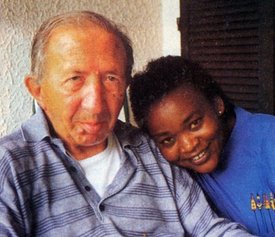 Five years ago today Monsignor Luigi Giussani died after suffering the effects of Parkinson’s Disease. I continue to miss his voice and witness to faith we profess in Christ.
Five years ago today Monsignor Luigi Giussani died after suffering the effects of Parkinson’s Disease. I continue to miss his voice and witness to faith we profess in Christ.
